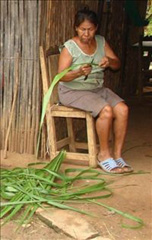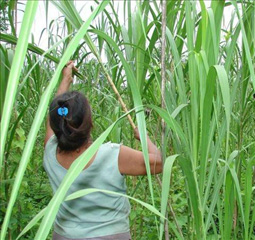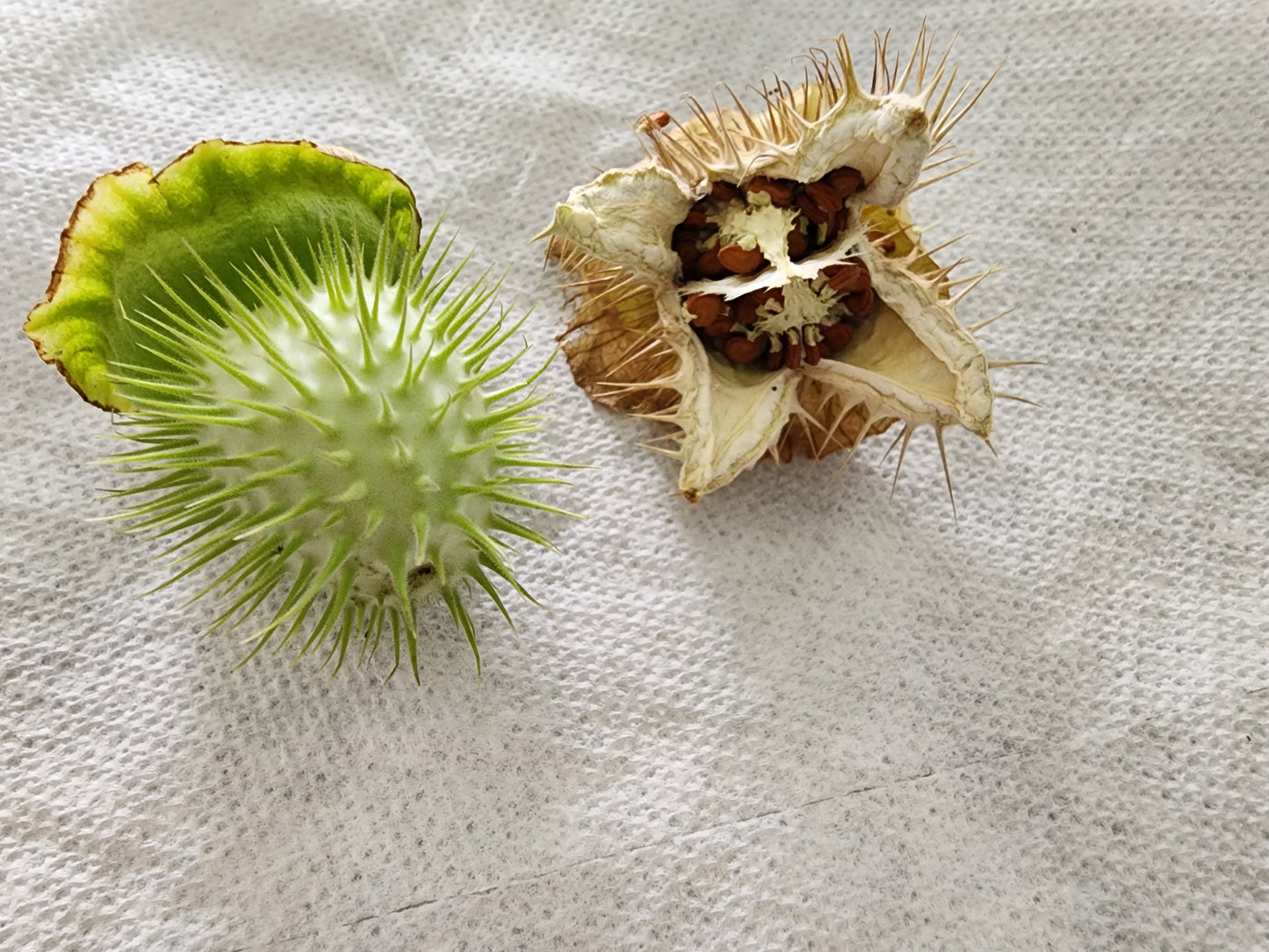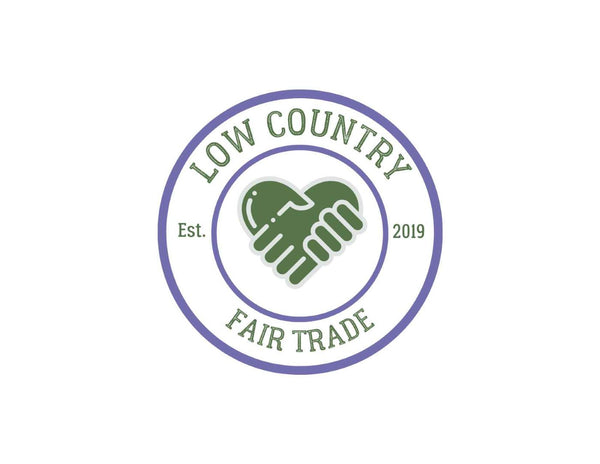Low Country Fair Trade
Devil's Trumpet- Night Blooming Moon Flower- Datura Innoxia - Seeds -USA
Devil's Trumpet- Night Blooming Moon Flower- Datura Innoxia - Seeds -USA
Couldn't load pickup availability
Datura Innoxia-Night Blooming
Also known as Devil's Horn, Devil's Trumpet, Moon Flower, and Jimson Weed.
The white and (sometimes) lavender-tinted, trumpet-shaped bloom of the sacred datura promises a wonderous garden of delicate beauty, moths, butterflies, long-tongued bees, hummingbirds, and magical moonlit nights. It gives rise to some of the plant’s other names, for instance, angel’s trumpet, devil's trumpet, moon lily, moon-flower, or belladonna (beautiful lady).
The sacred datura offers a stunning display of white and lavender trumpets, attracting moths, butterflies, bees, and hummingbirds. Also known as angel's trumpet, moon lily, or belladonna (beautiful lady), it promises enchanting moonlit nights in your garden fully opening after dusk. A true beauty with magical powers.
We grow this plant yearly and the seeds are harvested and stored in South Carolina. This plant is an annual and can be grown indoors, although it prefers outdoors in full sun most of the day and does well with some afternoon shade during the hot summer.
"Ingestion of the flowers or any other part of this plant can have dangerous, even fatal, consequences. All parts of the datura plant, also known as Devil's Trumpet or Jimson Weed, are poisonous. The seeds and young leaves of the plant contain the highest amount of toxic alkaloids.
Health officials say that similar or related plants, including Devil's Weed, Devil's trumpet, and Jimson Weed, often are referred to as moonflower and could have similar toxic effects. Within an hour of ingesting the moonflower plant, symptoms begin. Ingesting the plant causes agitation, confusion, and hallucinations.
- Species. See text. Datura is a genus of nine species of poisonous vespertine flowering plants belonging to the family Solanaceae. They are commonly known as daturas, but also known as devil's trumpets, not to be confused with angel's trumpets, its closely related genus Brugmansia.
Datura innoxia is an annual shruby plant that typically reaches a height of 0.6 to 1.5 meters. Its stems and leaves are covered with short and soft grayish hairs, giving the whole plant a grayish appearance. It has elliptical, smooth-edged leaves. All parts of the plant emit a foul odor similar to rancid peanut butter when crushed or bruised, although most people find the fragrance of the flowers to be quite pleasant when they bloom at night.
The flowers are white, trumpet-shaped, 12–19 cm (4.5–7.5 in) long. They first grow upright, and later incline downward. It flowers from early summer until late fall.
The fruit is an egg-shaped spiny capsule, about 5 cm in diameter. It splits open when ripe, dispersing the seeds. Another means of dispersal is by the fruit spines getting caught in the fur of animals, who then carry the fruit far from the mother plant. The seeds have hibernation capabilities and can last for years in the soil. The seeds, as well as the entirety of this plant act as a deliriant and have a high probability of overdose." Quoted from www.wikipedia.com
Share
About the Artisans
About the Artisans
 Joyeria Semilla meaning Seed Jewelry is a small fair-trade workshop in the Andean town of Villa de Leyva, Colombia. Girasol Taborda, a local artisan and social entrepreneur, started the workshop in the mid-1990s.
Joyeria Semilla meaning Seed Jewelry is a small fair-trade workshop in the Andean town of Villa de Leyva, Colombia. Girasol Taborda, a local artisan and social entrepreneur, started the workshop in the mid-1990s.
Joyeria Semilla’s objective is three-folds; to create new jobs, revive Colombia's handicrafts sector and to motivate locals to better manage their natural resources. The organization works primarily with socially and economically disadvantaged youths, single mothers and people with disabilities in the area. The company offers free training in product design, technical training and marketing to new members. Joyeria Semilla has trained them in the craft of jewelry-making.

Caña Flecha or “Gynerium Sagittatum” is a locally found palm tree in the regions of the Caribbean coast. The leaves from this plant are used for making jewelry, woven hats, bags and baskets. The Zenú Indians were and their descendants inherited the tradition of picking veins of the green palm leaf for weaving. These veins were made into woven hats and other products for their personal use.
The Zenú culture is said to have existed between 200BC to1600AD. With the arrival of the colonizers in the 16th century, the indigenous community declined of unknown reasons. Today a very small population remains that claims the inheritance of the almost extinct Zenú tribe. Known for their skills in the construction of major waterworks, canals and irrigation system along with being skilled goldsmiths, examples of their accomplished craftsmanship are found in various museums around the world. Their larger means of subsistence were hunting, farming, fishing and trading.
Caña Flecha is found in abundance in the region, and hence makes for a sustainable and naturally available raw material for these products. Every bit of the plant is utilized – from using in building walls and roofs in houses to food for cattle and medicinal purposes. It is from the central vein of the leaf that the fibers for weaving are obtained. After the hard surface is peeled off, the fibers are left in the sun to dry and undergo a natural tinting process; these fibers are barely about 1 millimeter in thickness and hence call for a lot of skill and patience to weave with. The dried fibers are then processed for natural coloration - some are boiled with lemon to whiten them and some are treated with mud and boiled with plantain leaves to blacken them. The designs are based on ancient motifs and mathematical representations, which are inspired by the early Zenú culture.










